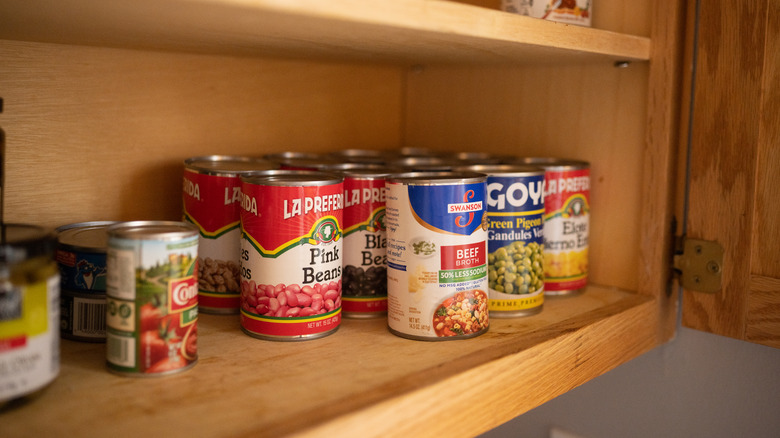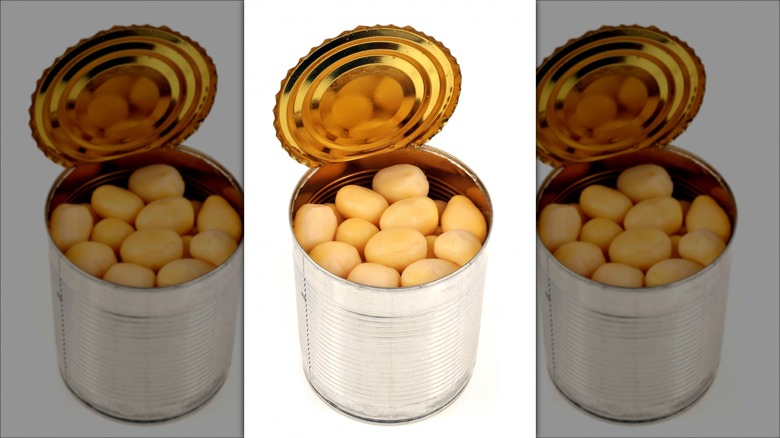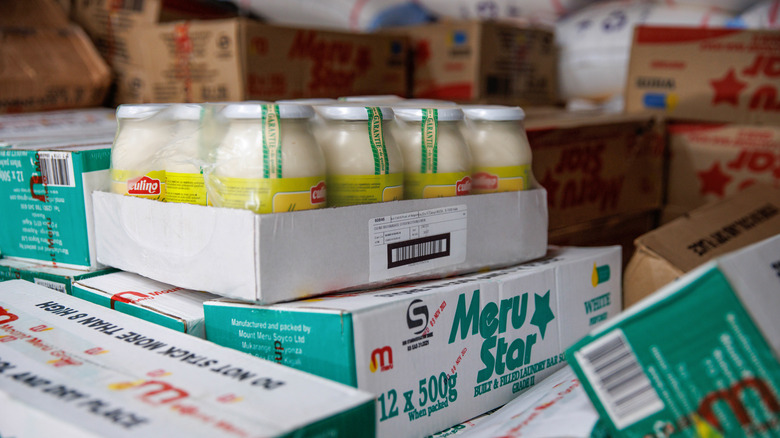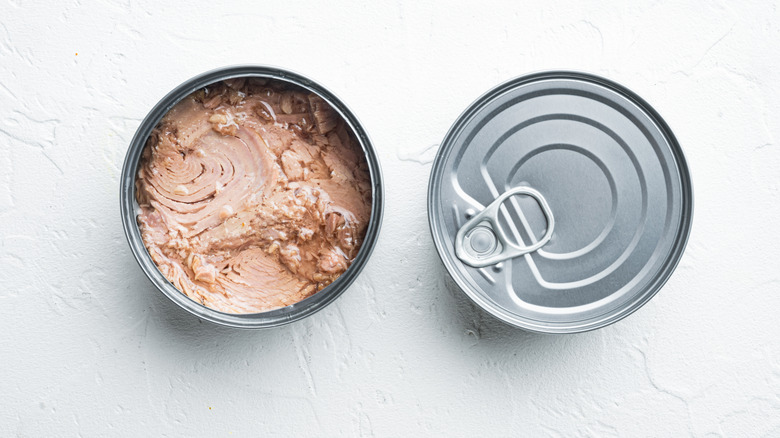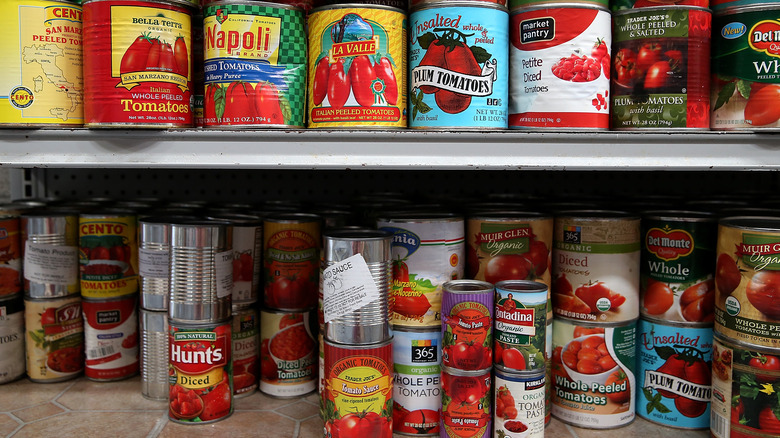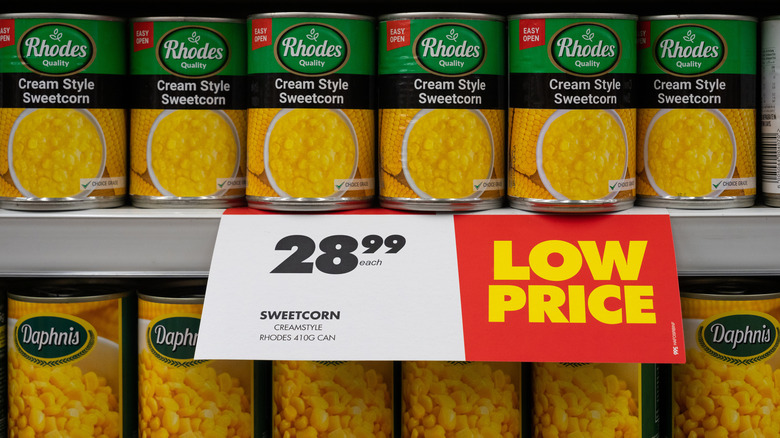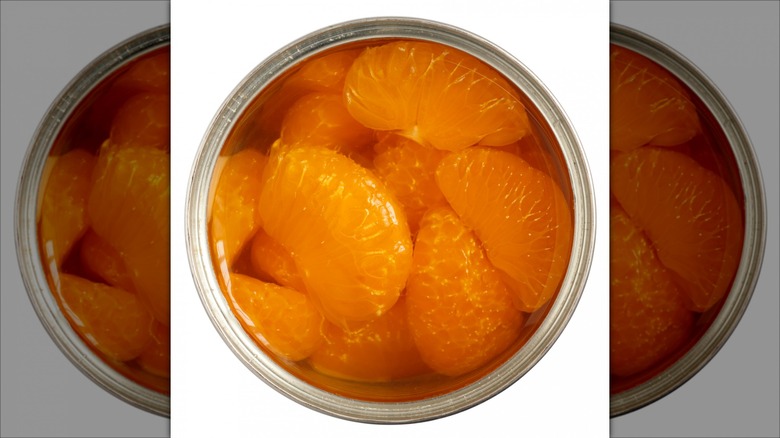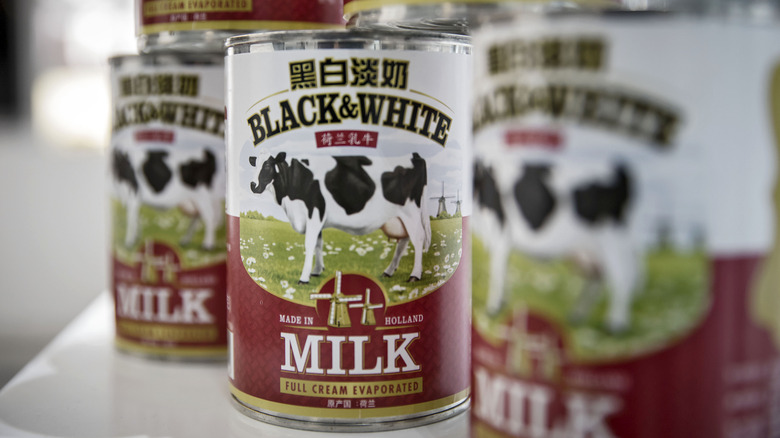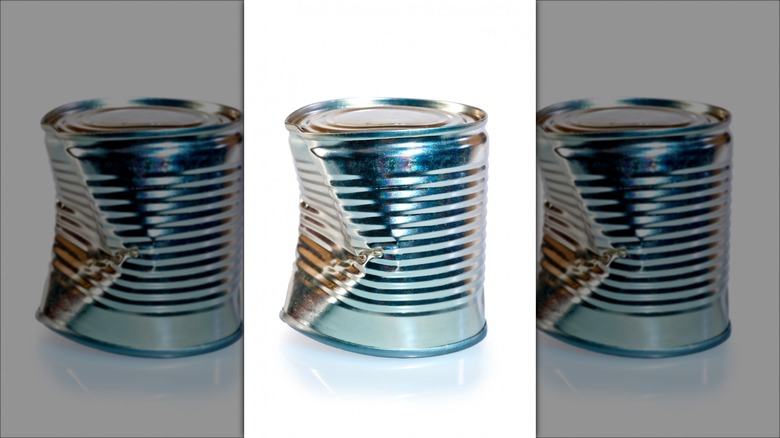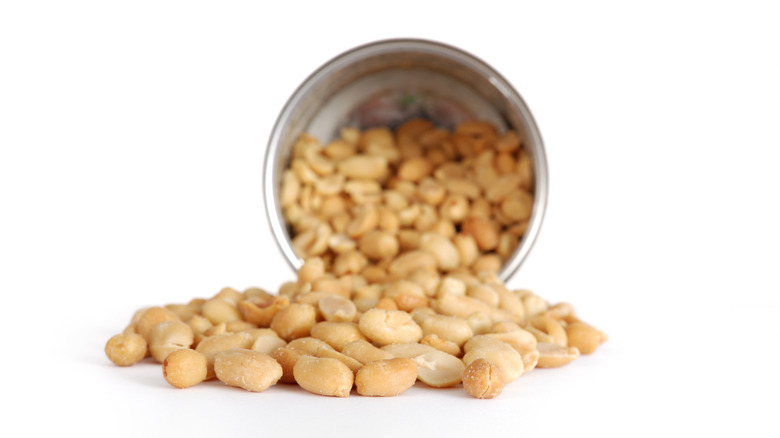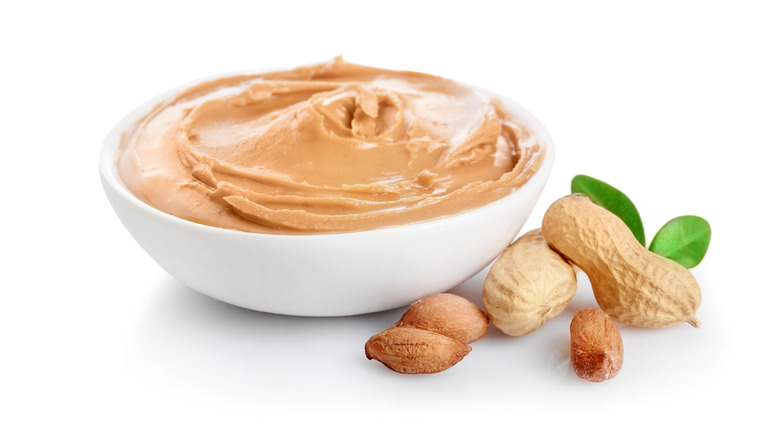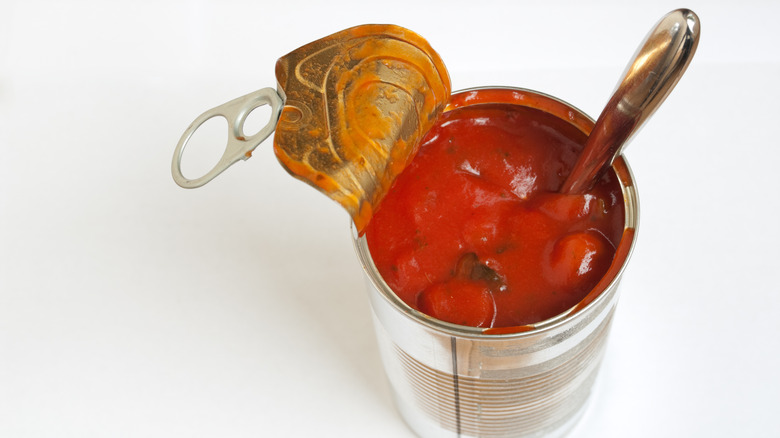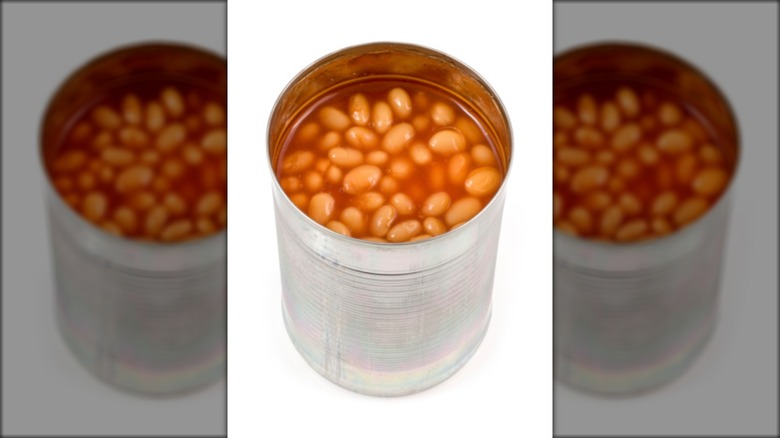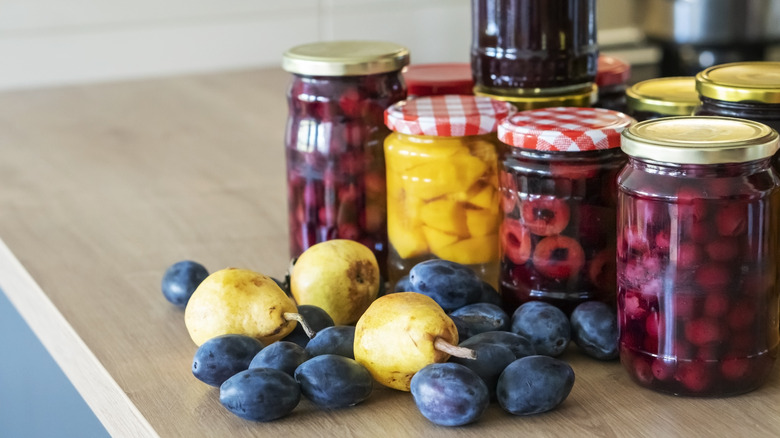7 Must-Have Canned Foods And 7 To Avoid In Your Pantry
If you live in an area of the country that sees severe weather, like winter storms, then you probably keep a well-stocked food pantry. And while the three-day supply is recommended by emergency preparation experts like those at FEMA, you may decide that you would like to keep a food supply that lasts a little bit longer than that, like for six months or more.
Keeping a six-month supply helps not only with emergencies but also with budgeting. If you haven't heard of the concept of shopping from your pantry, it basically means that you keep enough food in the pantry so that you can create meals for weeks without actually going to the grocery store. The longer you can do this, the more money you can potentially save because you're not buying stuff at the last minute. This process starts with some must-have canned food and other non-perishable items. From there, you'll build your family's menus around them.
To accomplish this goal, it would be helpful for you to know which canned foods last in the pantry for up to six months or more and which ones won't. This isn't to say that some of the items on the second list shouldn't be in your pantry. Rather, the foods on your "avoid" list just can't make up the bulk of your pantry prep. Without further ado, here are seven canned foods you should keep in your pantry and seven you should avoid.
Do store canned potatoes
Potatoes are a staple food because they are a cornerstone of so many popular recipes, like your favorite scalloped potatoes recipe. As such, people keep them in the pantry at all times because a quick lunch is just a turn of the can opener away.
However, if you're creating a pantry that will last at least six months, fresh potatoes aren't the way to go. That's where canned potatoes can be your best friends. Unlike fresh potatoes, which only last about two months max, canned potatoes have the potential to last for several years — usually two or three at least.
Many people are thrown off by the idea of the expiration or "best by" dates. It's true that the closer you are to those dates when you open the can, the fresher your food will taste. However, even if you were to eat your canned potatoes past the expiration date, most of the time they'll still be edible. Because of that, they are among the best foods to keep in your pantry if you're stocking your pantry with foods that will last six months or more.
Don't store extra mayo
Who can imagine a good tuna sandwich without plenty of tangy mayo? It's for this reason that so many people keep extra jars of mayo in the pantry. They believe that mayo remains good to go as long as it's unopened. However, even though it has shelf-stable ingredients, like vinegar, salt, and sugar, it also contains eggs. This ingredient eventually goes bad, even in a sealed jar. While some food experts believe that the canning process even stabilizes the eggs, there is some disagreement about this, which means that you might want to operate in the better-safe-than-sorry mode here.
This isn't to say that you can't keep extra mayo in the pantry. What it does mean is that you need to eat it quickly and keep no more backup than you can eat in a reasonable amount of time. Further, once you open your mayo, it does need to be refrigerated. There it will last a couple of weeks, so keep an eye on it.
There is one final thing worth mentioning, if you've opened your mayo and accidentally left it out overnight, toss it. Chances are that it hit the danger zone of 40 F to 140 F. At this temperature range, you run the risk of food poisoning due to bacterial growth.
Do keep canned tuna and other canned meats
When the power goes out, you want food in your pantry that you don't have to cook. That's why canned tuna is a great pantry staple. With a simple handheld can opener, a few condiments or even an avocado, and some bread, you have a sandwich. However, the benefits of canned tuna don't end there. Home chefs know that it is a staple ingredient in budget meals, like tuna casserole.
In the case of an emergency, it's recommended that you have 5½ ounces of canned meat or plant protein available per day. The average can of tuna has about 5 ounces, so you get most of your recommended daily allotment with just one can of tuna. Tuna is also a source of B vitamins, including B12, omega-3 fatty acids, and an important source of vitamin D. That should be enough to keep you healthy through the first several days of zombie apocalypse.
As for being an item that has staying power in your pantry, tuna won't let you down. It is estimated that an unopened, undamaged can of tuna can last in your cupboard between two and five years.
Don't store canned tomatoes longer than a year
The acid in your tomatoes is like a little chemistry factory that eats the cans from the inside out. This is only a slight exaggeration, though there is truth to it. That is to say, you can keep canned tomatoes in the pantry, but you shouldn't keep them for more than a year because they will erode as the acid starts to eat through the can. If you're gathering the raw materials for a pantry that will last six months or more, and you still feel like you want to include canned tomatoes, start with new cans at the beginning of the six-month period.
There is some disagreement about the length of time that you can keep tomatoes in the pantry. Some food storage experts believe that you can keep them for up to 24 months. Given the issue of acidic erosion, it's best to proceed with caution. If you have cans that start to smell bad, have sprung a leak, or generally give you the impression that what's inside isn't any good anymore, throw them away.
Do stock canned corn
It is said that canned vegetables have the same nutritional value as their fresh or frozen counterparts. Still, the taste and the texture of canned veggies are often found lacking. Many are mushy, taste bland or too salty, or are generally subpar. Of all the canned vegetables, corn has mostly the same taste and texture as fresh or frozen, making it a pantry win.
But there's other good news as well. Aside from retaining its taste, it's a long-lasting canned food. If you store canned corn at 40 F, expect it to last for five or six years. It's a good source of vitamin A, as well as a lot of different minerals and carbohydrates. And it stars in some pretty tasty pantry-to-table recipes, like corn chowder or corn casserole. Finally, since your average can of canned corn is already cooked, you only need to heat it up in a pinch.
Don't stockpile canned citrus
High-acidic foods like canned oranges or grapefruit have the same effect on a metal can that canned tomatoes do. Eventually, the acids in the food interact with the metal of the can, causing the acids to leach aluminum, or sometimes tin, into the food. This is one of the reasons why it's best to eat any kind of canned citrus fruit within 12 months or less of putting those foods into the pantry. The interaction between the can and the acid in the food changes the texture and flavor of the food over time. Aside from making your canned grapefruit or oranges less tasty, this process also makes them less nutritious.
These canned foods represent a gray area, meaning that if you plan on eating these items within a year, then they fit the six-month criterion that was set forth at the outset of this article. The gray area comes in if you don't know when the food was canned. That is, you may be closer to the expiration of the "best by" date and not know it, which can happen if the label gets destroyed, for example. Here's where it might be better just to toss the can.
Do stash canned milk
It's easy to take staples like milk for granted until you have none. That was the driving force behind the "Got Milk" celebrity milk mustache commercials. Canned milk ensures that you always have milk on hand for cereal, your morning coffee, and your favorite mac and cheese recipe. You'll never have to wonder if you got the three cups of milk a day that some authorities suggest having available should push come to shove. Even if you lose power in your fridge for a while, you'll still have milk regardless.
If stored properly, canned milk lasts up to six months on the shelf. And it's not just plain old canned milk that you should store. Sweetened condensed canned milk is a nice item to have on your shelves as well. It allows you to make desserts like Oreo cheesecake, whether you want to make it to while away a snowy day or because you have a special occasion.
Don't hold on to cans of food that are severely bent or broken
Not keeping dented cans in your pantry holds more importance than just ensuring that the optics of your pantry are pleasing. While some dents pose no threat to you, a severely bent or broken cause quite a lot of problems, optics being the least of them. Deeply dented cans may develop punctures. These, in turn, allow bacteria into the can. If you eat food that has been contaminated by bacteria, you open yourself up to the possibility of spoiled food at best and of getting food poisoning at worst.
Additionally, if the misshapen part of the can is on the lid, sharp points might develop and a slew of cut fingers could ensue. In light of all of this, the United States Department of Agriculture recommends that you throw away cans that have dents that are larger than the depth of your finger because the chance of leakage is too great from a large dent.
Do make room for canned sauces
Budget cooking requires creativity and ready-made canned sauces play right into that. Although it seems better to cook from scratch, cooking from scratch has a drawback. Unless you have all the ingredients for your favorite recipes, including spices and herbs, it's hard to make something completely from scratch.
The advantage that canned sauces bring to the mix is that they're already seasoned. This allows you to have more flavorful, full-course meals without the effort or time expense. The sauces also add moisture to dishes, making eating more enjoyable in the process. To give you some perspective, it's going to cost you, at a minimum, $50 to get your spice rack up to snuff. However, because canned sauces give you so many options, it isn't as urgent to buy spices you can't afford yet.
Aside from this, they make dinner or lunch prep really quick. It's nothing to cook up some pasta and pour a little marinara sauce from a can over the top of it. Sauces like marinara will last up to 24 months in the pantry, giving you lots of meal options for many months.
Don't rely on canned nuts
Nuts don't last quite as long as people believe they do. Nuts without the shell for four to six months. The ones that have their shell remaining can last up to nine months. Technically this puts them in the six-month window. However, nuts come with some pretty serious issues that make them less pantry-ready than people believe. Mold develops. Shriveling up to practically nothing also happens. And pantry pests are actually a thing. You read that right. There are little buggies that get into nuts and treat them like a Christmas feast.
Nuts can also take on the smell of house paint. It doesn't mean that Sherwin-Williams has set up camp in the pantry. What it does mean is that your nuts have gone rancid. If you bought them from the bulk bin at the grocery store, this is particularly likely because the constant opening and shutting of the bin lid allows oxygen to get in and speeds up the aging (and rotting) process.
And really, it should be said that while lots of people stash their nut-filled trail mix in the cupboard, the pantry isn't the best place for it. The fridge or the freezer will treat your nuts a lot better, which, in turn, makes them last up to two years. So if you're looking for shelf-stable items that will last six months or more, skip the pantry for the nuts and stick them in the refrigerator instead.
Do embrace nut butters
It's difficult to conceive of a pantry of the most useful food staples without including nut butters. Certainly, this includes peanut butter, but nowadays, the options are broader than that. Cashew and almond butter come to mind. They add a different flavor profile to even the most tried and true recipes like peanut butter and jelly sandwiches, except of course it wouldn't be peanut butter on the sammy. It would be another nut butter of your choice.
You can count on your unopened jar of peanut butter or cashew butter being there for at least 24 months. Once you open it, you're looking at it being able to eat it for only about three months. Peanut butter's longevity is attributed to its fat content, as well as its general lack of moisture.
There is one caveat of note. Natural nut butters, because they contain no preservatives, don't last as long as their less natural counterparts, eat them up within a couple of months. And it's possible to extend the life of all nut butters by placing them in the refrigerator after opening them.
Don't indulge too much in high-sodium products
From a comfort food recipe point of view, few foods elicit the kind of emotional response that soup does. Underneath their pop-top lids hide the promise of comfort food memories and tummies filled with a kind of security that only soup can bring. For most people, soup represents an important part of a stocked pantry. Cans of soup have the potential to provide dinner for literally many years.
However, despite fitting the goal of stocking canned foods that last at least six months, soup, and certain other kinds of canned food like canned meats, come with a pretty major drawback. They contains copious amounts of sodium. The salt content in canned foods does make sense from a practical point of view, given that salt counts among the most common preservatives on the market. It's why soup and other sodium-infused foods, like canned meat, last forever and a day on the shelf.
However, too much sodium in the diet has been attributed to health conditions like high blood pressure, poor heart health, obesity, and certain kinds of cancer. If you feel you really must have soup (or any other kind of high-sodium canned food), balance things out by keeping other less salty foods in your six-month pantry, too.
Do include canned beans
From a purely economics point of view, you'll want to keep bags of dried beans, like black beans, kidney beans, and white beans, in your pantry. However, they come with one huge drawback. They have to be soaked and cooked for a long time before you can eat them, and when the power goes out, and you need food right away, you'll starve if these are the only things in your cupboard.
Keeping cans of beans in the cupboard alleviates this problem. They're pre-cooked and can be heated up on a propane stove or via a solar-powered cook pot. Because they're soft straight out of the can, you won't be waiting hours to eat. They make a good base for stew. They're also nice to add to corn or flour tortillas for a quick serving of tacos. And pinto beans are not only good for a bowl of beans, but if you blend them up, you have refried beans in just a few minutes. They'll last in your cupboard for two years before they go bad so you have plenty of time to try out those recipes we've been saving on your phone.
Don't rely on home canned stuff
Thanks to the popularity of the current homestead movement, lots of people have started to grow gardens and can the goods that come from them. This is a smart move. However, it gives people a false sense of security when it comes to stashing those jars of home-canned goods in the pantry. The fact is some home-canned foods, whether filled with homegrown food or not, should not be stored in the pantry at all, let alone in a six-month pantry.
Much of the reasoning behind this has to do with the fact that certain foods, even if they're canned, get rancid pretty quickly. Or they develop those micro-bugs, like Clostridium botulinum, or botulism, that are bound to make a person sick.
Homemade pesto made from your grandma's recipe or herb-infused oils are some examples you might find in your pantry. Dairy doesn't fare much better. When stored at room temperature, it can also spark an outbreak of botulism under the lid. And if you thought about putting cake or bread in a jar, well, you'd get botulism from that too. Other home-canned items that you shouldn't keep in the pantry because they will go bad or grow micro-bugs include eggs, starches, like pasta or rice, and hardy purees.
